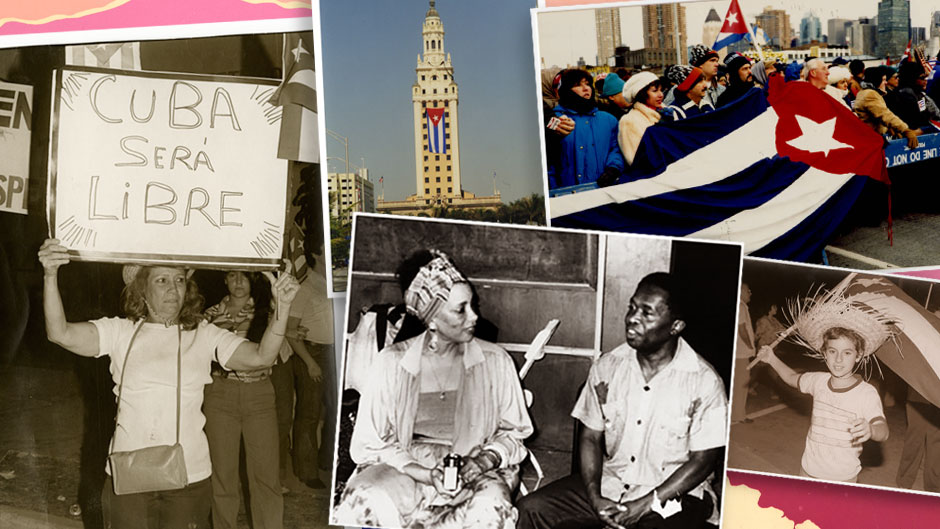There is arguably no place outside Haiti and Cuba more riveted by the ongoing turmoil engulfing both Caribbean nations than South Florida, the epicenter of the long and painful Cuban and Haitian diasporas.
But as Cuban authorities punish protesters who took part in anti-government demonstrations that swept the island just days after Haitian President Jovenel Moïse’s shocking assassination, the University of Miami can offer unparalleled resources for understanding the ongoing crises in our backyard—and our hearts.
“Although the situations are different in each country, these events are having a profound impact on South Florida’s Cuban American and Haitian American communities, including many members of the University of Miami Libraries faculty and staff,” Charles Eckman, dean and University Librarian, stated in a recent message to his team.
“This is also an important moment for fostering a deeper understanding of the forces shaping these unfolding struggles,” Eckman continued. “The UM Libraries have significant resources for learning more about the Cuban and Haitian diaspora communities as well as the history and cultures in Cuba and Haiti.”
Among the resources is the Cuban Heritage Collection (CHC), the largest archive of materials about Cuba outside of the island and the largest collection in the world documenting the Cuban diaspora from colonial times to the present—including the real-time present.
The CHC announced via social media that it is collecting digital materials, including tweets by both dissidents on the island and exiles in South Florida, posted during the historic and spontaneous protests, and the ongoing Cuban crackdown they precipitated. During the demonstrations that erupted on July 11, Cubans took to the streets chanting “libertad” and holding signs that read, “Down with the dictatorship”—extraordinary acts against a repressive regime that some view as a watershed moment for reform.
CHC’s archival team is also creating an oral collection of personal stories and lived experiences of many of the Cuban activists calling for social change to document the present and help contextualize the past.
The CHC is located on the Coral Gables Campus, in the Otto G. Richter Library’s Roberto C. Goizueta Pavilion, but many of its assets are digitized and easily accessible to the public online. This includes the Luis J. Botifoll Oral History Project, which contains interviews primarily with the first generation of Cubans to leave the island after the revolution. And StoryCorps Historias includes all interviews with self-identified Cubans or people of Cuban descent who shared their stories with the national StoryCorps project, now archived in the Library of Congress’ American Folklore Center.
Several research guides on Cuba-related topics also are available online, but those who wish to visit the CHC in person may do so by appointment.
The University’s younger but ever-growing Haitian heritage collection in Special Collections at Kislak Center at the University of Miami also holds materials related to Haiti and its diaspora. These include the Haitian Diaspora Oral Histories, the Caribbean Diaspora Oral Histories, and many other relevant materials.
Special Collection’s guide to its 2019 exhibition, “Ansanm, Ensemble, Together,” also offers a glimpse at the ongoing effort to document the Haitian experience through rare books, manuscripts, oral histories, and archival collections. Many of the latter were donated by Haitian Americans who fled the world’s first Black republic during prior upheavals and founded grassroots, service, and cultural organizations across South Florida.
And it is those stories that archivist Beatrice Colastin Skokan is most committed to collecting as Haiti’s newly installed prime minister, Ariel Henry, tries to quell civil unrest and lead his beleaguered nation to elections in the wake of Moïse’s July 7 assassination.
“What we’re interested in is the complex and whole story, not just the discourse of those who have the privilege of being in positions of authority,” said Skokan, the curator of the Caribbean Collections and head of manuscripts and archives. “The current interim government does not necessarily reflect the aspirations and hopes of the entirety of Haitian civil society, especially those who are marginalized, and we’re going to continue to document Haiti’s evolving story by working with the organizations and individuals in the diaspora who are capturing those stories and are interested in preserving them.”
Like many of the materials in the CHC, many of the materials in the Haiti collection are accessible online, but visitors may make an appointment to visit the Kislak Center.

